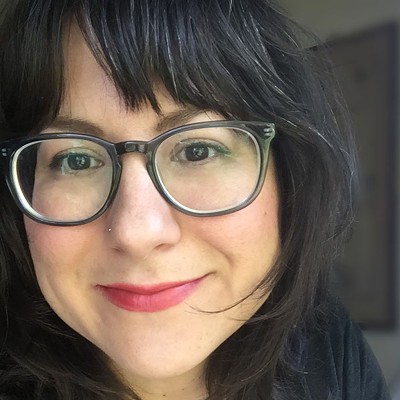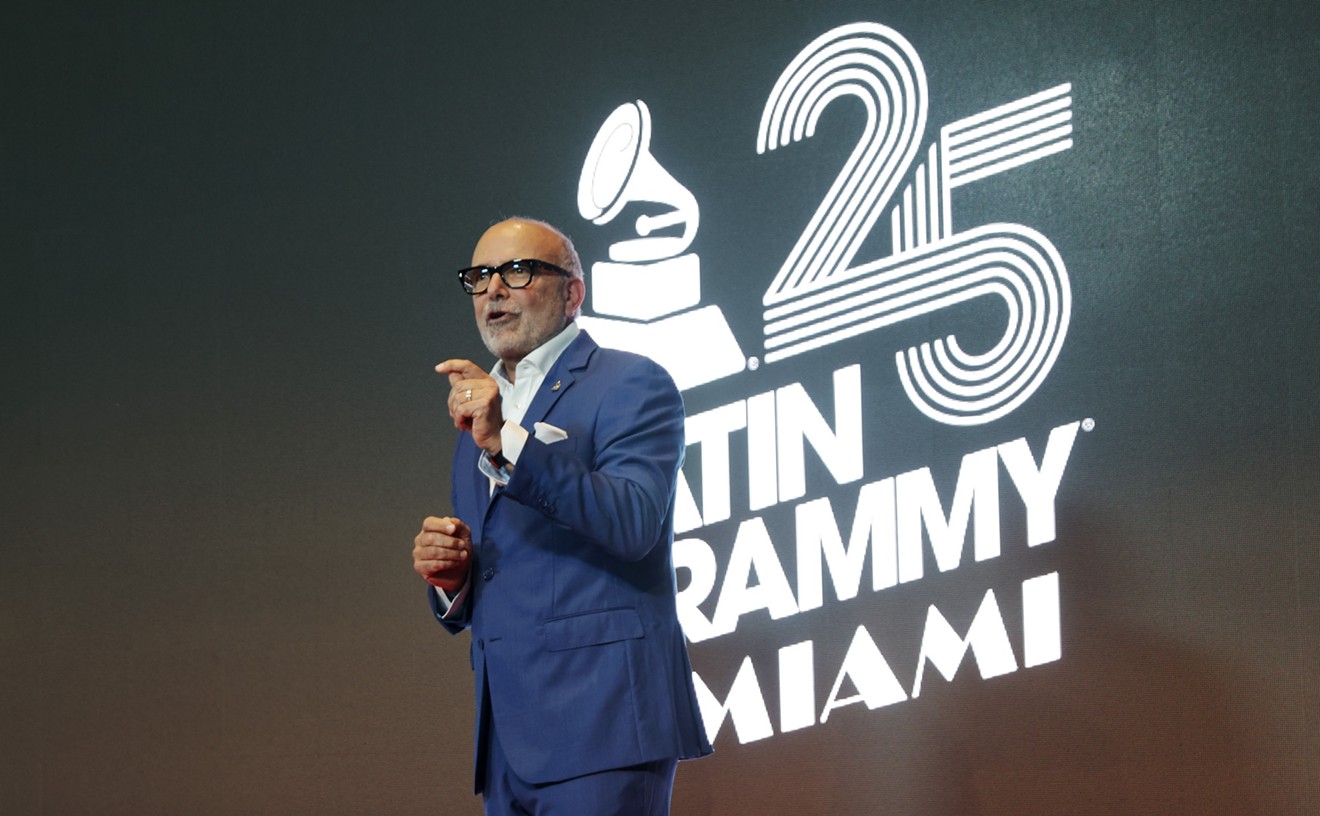Politics, punk, and pot — these three things provide plenty of perspective on headband-wearing, multilingual musician Manu Chao.
A thoughtful philosopher whose addictive and energetic concerts rival those of Phish, Chao has been making music for more than 25 years. He has played infrequently in America. But his La Ventura world tour will stop at the Klipsch Amphitheater this Friday, and it will be his first concert in South Florida.
That Miami has been deprived of the Manu Chao experience is confounding. He is such a perfect fit for this multicultural community. And a long look at this strong character — plus his affinity for the Three Ps — reveals just how nicely Miami and Manu Chao go together.
Politics. Born José-Manuel Chao in Paris to Basque and Galician parents who fled Franco's dictatorship, little Manu was raised in a dodgy immigrant community. He grew up with tunes and thugs, telling the Boston Globe in 2007: "The guys in the gang listened to '50s rock 'n' roll, and if you played newer songs, they beat you." So, logically, he started rockabilly groups Los Carayos and the fabulously named Hot Pants.
With his brother Antoine, Chao later formed punk-ska-salsa band Mano Negra in the late '80s, which eventually signed to Virgin Records. Speaking with the Guardian's Garth Cartwright, he said, "With Mano Negra, the record company was telling us there was strong interest in the U.S., but we said, 'No, we're off to Latin America.' The decision screamed commercial suicide, but it turned out for the best."
Eventually, a grueling South American tour resulted in the band's demise, but the precedent was set. Unlike less confident international artists, Manu doesn't need North America — he has the rest of the world. Kind of like South Florida, isolated from most of the continental U.S. but connected very directly to Latin America by both ocean and culture.
The 2009 U.S. Census shows Miami leads America in its number of foreign-born residents. Like Chao or his parents, many locals were either born in another country or they are the children of immigrants. This offers a different perspective on government, influenced by both the present environment as well as the individual's country of origin. In short, the immigrant experience offers a more international perspective and a broader emotional connection to the life and culture of countries beyond your own.
Chao's attitude is basically, I don't give a fuck about you, but I give a fuck about stuff. And that matches the outlook of many hard-line Caribbean, South American, and Central American transplants in South Florida. These dogmatic thinkers have polarizing perspectives. But homeland politics, especially of Cubans, Venezuelans, and Argentines, are a real part of the lives of these everyday Americans. It's this attachment to ideology and a cultural nostalgia that makes Chao a cadet of Latin American sensibilities and explains his rampant popularity there.
So much of South Florida's lifestyle is entrenched in a cultural identity that emerges from politics, history, and personal affiliations. It is probably the only place in the States where you'll often hear people brag about their Spanish heritage rather than their Irish roots. Chao sings in Spanish, French, English, Portuguese, Galician, Arabic, and even the West African language of Wolof. He has all of the world, not just America, inside him.
Punk. Radical ideologies make Manu Chao an extreme yet admirable character. In an interview with David Shankbone, British journalist, musician, and punk expert Vivien Goldman described Chao by saying, "He's one of the punkiest artists out there I can think of. It's an inclusionary spirit that is punk."
So it was fitting that Chao's U.S. television debut took place on former Black Flag frontman Henry Rollins's IFC talk show in 2007. As cited by the Boston Globe, Rollins compared Chao to Bob Marley and Joe Strummer of the Clash. But it wasn't a matter of musical influences. It was that, "For them, music is a vehicle, a weapon, a gauntlet thrown down."
Since 1995, Chao has worked as a solo artist. He created his first album, Clandestino, alone on a portable eight-track recorder. Then came Próxima Estación: Esperanza, and six years later came La Radiolina. He produced Dimanche à Bamako, an album by blind Malian couple Amadou and Mariam. And most recently, he released Baionarena, a 2009 live CD and DVD that demonstrate his undying commitment to mind-blowing, blissed-out concert experiences.
It's easy to put a tag on Manu's music. Latin alternative is one, but it's not exactly Latin music. He's European and he doesn't just sing in Spanish. As he told the Guardian in 2007: "Don't call me 'world music' — that's a neo-colonial label you British and Americans like to use for music not sung in English."
Pot. Certainly South Florida doesn't have an exclusive claim on marijuana enthusiasts. But it has long been one of the main ports of entry for a drug mostly dangerous for causing cotton mouth and the munchies. Manu Chao last hit the English-speaking media with a wave of interviews in 2007. But he seemed most comfortable talking to High Times. That might have been because the interview involved sangria and a spliff. He spoke casually about not getting high in preparation for performances, but using weed to create. "I also try to never smoke when I don't have a pen with me, and a guitar," he said. "Without a pen and guitar, if I smoke I get nervous, because the ideas fly, fly, fly!"
Given the American political climate, with culturally and legally conservative approaches to the things that define and inspire Chao, it seems fitting that he doesn't visit the States often. But he has a devoted bastion of fans in South Florida. Not that the rest of America doesn't have a thing for music from other countries, but unlike fads such as Buena Vista Social Club and Putumayo, Miami is actually committed to international music.
It just makes sense, doesn't it? The political commitment, international perspective, appreciation of marijuana — the rhythm and spirit of Manu Chao is just the right fit for our oddly shaped city. His music will certainly create a magical, sweaty, and memorable night on Biscayne Bay, that body of water connecting Miami to the rest of the world.











